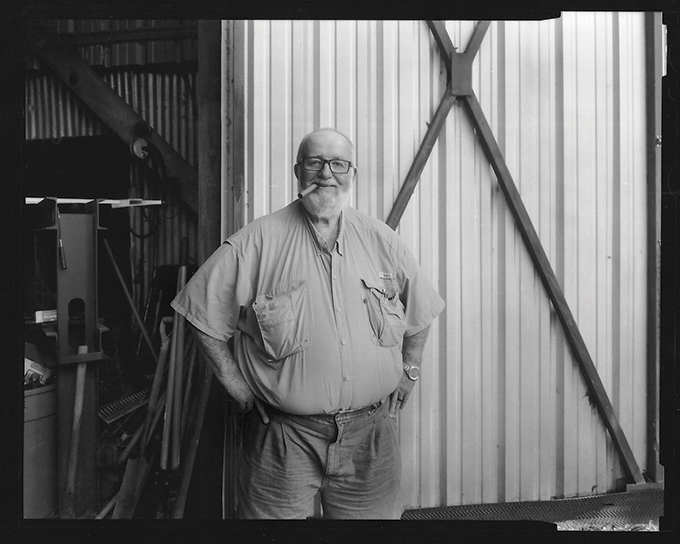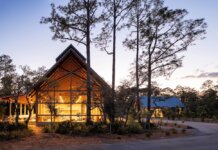 Eric Dusenbery is a documentary photographer who lives in DeLand, Florida. He is currently at work on a book project called Sidetracked: Travels Across the Undiscovered South. An award-winning journalist, speaker and workshop leader, he is also photographer/author of two books: “Florida Soup: Putting History On the Table,” a chronicle of the Florida fishing industry, and “Volusia Voices,” an account of life in Volusia County, Florida. Emphasizing the traditions of documentary photography as a way of seeing and interpreting cultural life, the project fieldwork is accomplished through the lens of large-format, black-and-white film photography. Dusenbery’s work in this issue of Business Alabama is part of his Sidetracked project, which will include stories from two more Alabama counties.
Eric Dusenbery is a documentary photographer who lives in DeLand, Florida. He is currently at work on a book project called Sidetracked: Travels Across the Undiscovered South. An award-winning journalist, speaker and workshop leader, he is also photographer/author of two books: “Florida Soup: Putting History On the Table,” a chronicle of the Florida fishing industry, and “Volusia Voices,” an account of life in Volusia County, Florida. Emphasizing the traditions of documentary photography as a way of seeing and interpreting cultural life, the project fieldwork is accomplished through the lens of large-format, black-and-white film photography. Dusenbery’s work in this issue of Business Alabama is part of his Sidetracked project, which will include stories from two more Alabama counties.
 Michael Barnes
Michael Barnes
Owner of Michael’s Southern Foods Restaurant
Brantley
“It was a dream to live in a place like this. You can’t ask for any better place to be. I was born in Fort Lauderdale, Florida. My parents moved here in 1975. We didn’t know a soul. They wanted to get out of the southern Florida lifestyle. We were growing up so fast, and my father wanted a farm. We were on our way to Missouri, but we stopped here and that was the end of that.
“When we moved here we were strangers and nobody knew us. But, they took us in like one of their own and have treated us like that ever since. My father died here and is buried at the local cemetery. My grandmother moved here when I was still in high school. She was from Pennsylvania. Both my parents are from the north. Everyone thinks I have a funny accent. When we first moved here, people would ask us, ‘Why in the world did you move to Brantley? Are you in the witness protection program?’ I never see myself moving away from here. I’m stuck.
“When I went to work in the restaurant the first time, it wasn’t because I enjoyed cooking — it was just a job. I don’t think I cooked at all. Now I do everything here from cooking to fixing toilets. Whatever needs to be done.
“I think a lot of our success is because of who we are. We’ve been part of this community. My wife was born and raised here so she’s more entrenched here than I am. I have been assimilated. Resistance is futile. You become part of that or it becomes part of you.
“This is a hard place to eke out an existence. You are at the mercy of the local crowd. But, they’re very faithful. They’ve kept us here and that’s what you’ve got to draw on. It takes a lot of hamburgers to make a bank note and the insurance on this building is huge.
“It’s a love-hate relationship within the restaurant business. I’m going to, hopefully, go back to what I dreamed of in the first place — to do things you can’t get anywhere else in town.”
 Billy Davis
Billy Davis
Agriculture Business
Crenshaw County
“Back in the day, I would wake up on a Sunday morning and come to town. People were bringing their pickup trucks full of peanuts. The whole town smelled like peanuts. Peanuts were king.
“I can also remember seeing mules and wagons come in from the farms. I’m talking about the mid-1950s. I think a lot of stores in town stayed open to just about midnight because the farmers all came to town. It was a carnival atmosphere.
“There’s not nearly as much agriculture as there was back then. The land is still here. But, there are acres and acres of pastureland and pine trees that used to be row-crop land.
“There are a lot better places to row-crop farm than this area — the land here is just not as conducive. When you see what real agriculture row-crop production looks like — the Midwest, the Delta Mississippi, parts of Florida with rich flat land and huge fields, it makes you wonder why we even tried.
“A friend of mine had a local cotton gin. He’d started a feed business and was moving his cotton seed to the dairy industry in Florida. He developed it into a viable little business. I had a trucking and agriculture background — well, I liked what he was doing. I started working for him, just driving. Eventually, I was able to buy the business from him.
“We chose to stay in a small, rural area. My wife is college-educated and I’m college-educated but we did not want to move anywhere. We wanted to stay true to our roots. Everything I’ve done, even though it might’ve been with trucking, has been agricultural-related.”
 Boyd Berry
Boyd Berry
Owner of C.L. Berry Mercantile
Glenwood
“As far as any industry — there isn’t anything here, now. I just sit here and run this little store. This building was built, they say, in 1907. When daddy moved in here in 1953, he put in a meat counter.
He butchered up cows in here until 1961, or so. They would do the actual slaughtering up in the woods at a place called the Butcher Pen, right next to a tree. They would bring the carcass here and he’d cut it up. They cut all the meat by hand. I would help wrap the meat. I didn’t do any cutting — I always hated that.
“After they closed down the meat butchering, he kept it as a general store.
“There used to be a mining company here — iron ore. They had a railroad that ran through Glenwood — this place was booming back then. They had the iron ore stockpiled right over there. You couldn’t even see the trees on the other side they were piled so high.
“There were two barber shops. One of the barbers had a shower in the back. Those iron ore men used to come in here and take a shower every Friday night. They would be lined up outside — they could get a haircut and a shower.
“There’s quite a bit of difference between then and today. There’s nothing going on here now. Farming is near about gone. I think they said between 400 and 500 people lived around here at that time. Now there’s probably about 200 people.
“I just go with all the changes that occurred around here. What else are you going to do?”
 Wayne Rolling
Wayne Rolling
Owner of Luverne Hardware
Luverne
“I’ve had the hardware store for 22 years. My customers become my family. It’s special.
“We have a pretty good crowd on Saturday mornings here at the hardware store — we do biscuits. I have a good friend who makes biscuits every Saturday morning and a lot of guys show up to eat sausage and biscuits with me. You always look for something you can do in the retail business to draw your customers closer to you. And, that’s what we did. You might be able to do that in the city, but not likely. It’s very rural here so we’re just a little different.
“We’re all competing with the internet now. The internet side of things is somewhat scary. Thank goodness they just passed the sales tax on the internet. That’s a blessing from our side of things because they had that advantage right off the bat. But now, we’re going to see the playing field level up. I’m proud to see that. I knew it was being discussed, but I thought the big businesses that have so much to do with the internet would have enough clout to fight it and stop it. But, it’s good to know that it didn’t work.”
 Matthew Pippin
Matthew Pippin
Owner of Pippin Family Vineyard and Winery
Patsburg
“Rural is home. I went away to college to play football but I came back and started teaching U.S. history. I eventually transitioned into teaching agriculture.
“Living in rural areas, you feel a connection to history and family. Alabama is agriculture. Muscadines grow wild in rural areas around here and we decided to plant some additional varieties of grapes to see what would happen. When a storm destroyed our poultry farm, we began construction on a winery. We did most of our own construction work — from painting to reclaimed wood carpentry.
“It didn’t happen overnight, but with a lot of research and learning — and a lot of trial and error — we became wine-makers. We produce five different wines and word seems to be getting out that, yes, Alabama can produce good wines.”



